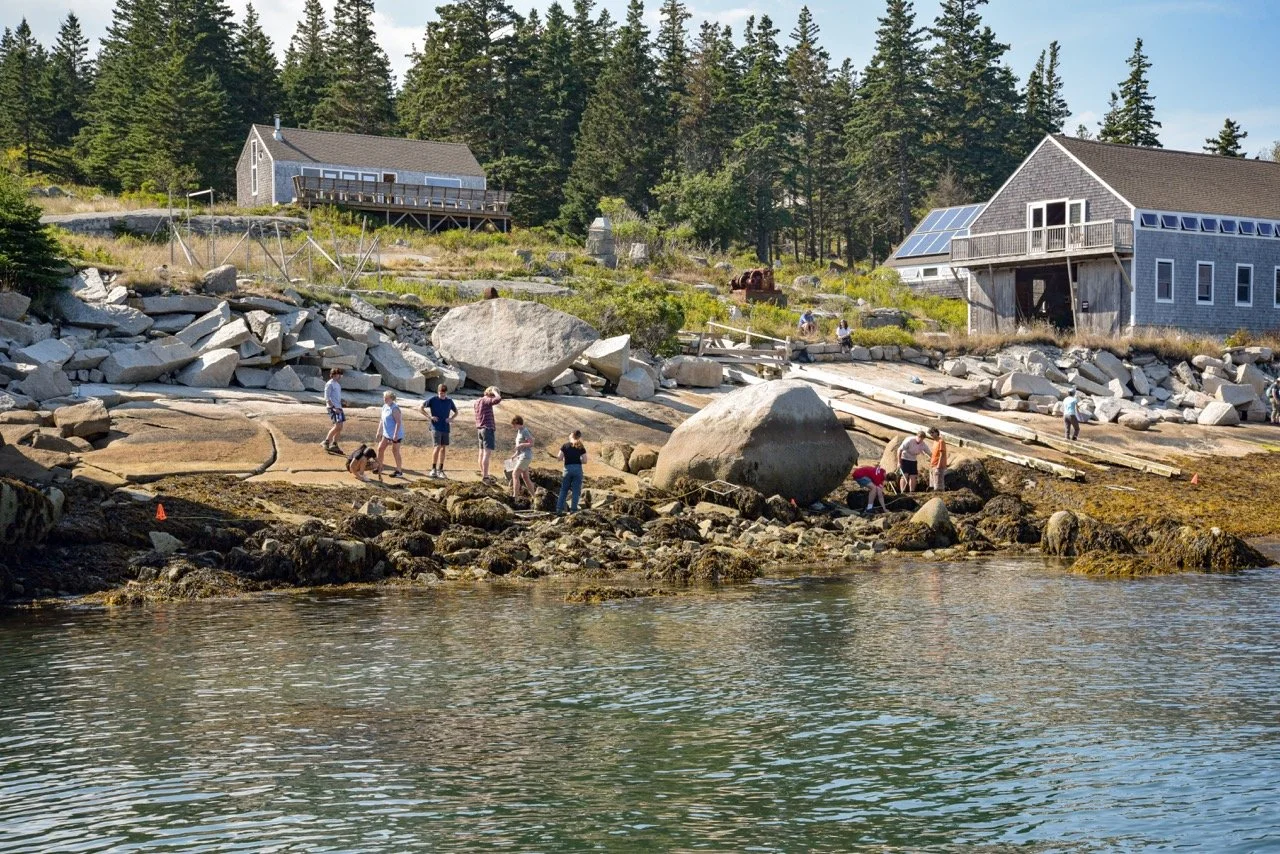Community Driven Research Findings
In 2023-2024 we hosted several conversations to help direct our Research program, and continue our tradition of being community-driven.
Staff and board members of Hurricane Island Center for Science and Leadership hosted an event a the Field Research Station with professional scientists and academics, hosted an event on Vinalhaven with members of the fishing community, residents, island educational staff, and we also hosted an event in Rockland for waterfront users and community members from a broad background.
In addition to these events, we also had a booth at the Fishermen’s Forum in Rockport - a well attended local marine expo for fisherfolk, aquaculturists, regulators, and scientists.
In addition to notes from the meetings, questionnaires were widely dispersed in print and via email.
Based on the surveys and notes, below are the science and research questions our community wants answers to…
Findings
Aquaculture
How resilient are potential aquaculture species to different types of environmental change?
To what extent are Maine mariculture species resilient to climate change? What life stages are most vulnerable to warming and acidification? How will this impact Maine's mariculture economy?
What impacts do rising sea surface and water columns temperature have on aquaculture species?
What is the role of aquaculture systems in sequestering carbon, and how does it contribute to blue carbon ecosystems?
How do aquaculture systems cope with environmental change and can certain species or cultivation practices mitigate its effects?
How can aquaculture be developed and managed sustainably to minimize environmental impacts and promote ecosystem health?
How does aquaculture impact nutrient cycling in the local marine environment, and what are the implications for eutrophication?
What is the ecological interaction between aquaculture operations and wild ecosystems on Hurricane Island?
Climate
How is the climate changing in the Gulf of Maine?
How are species interactions and distributions impacted by climate variability and change in the Gulf of Maine?
topic: Climate changes in the rocky intertidal compared to other areas in the Gulf of Maine
Climate Change impacts on Ecosystems - with long-term monitoring of Hurricane Island ecosystems
What scientific questions are most important to the coastal communities of Penobscot Bay, in the context of a changing climate?
Organismal and ecological responses to climate change in marine and terrestrial realms
What scientific questions are most important to the coastal communities of Penobscot Bay, in the context of a changing climate?
How is climate change affecting the coastal ecosystems of Hurricane Island?
How are commonly maricultured species in Penobscot Bay adapting to changing environmental conditions, especially considering the contentiously predicted weakening of the Gulf Stream?
How must offshore/inter-bay marine research adapt conventional research-design paradigms + programming in light of the climate crisis?
Impacts of ocean temperatures on the distribution and abundance of marine organisms
Temporal changes of marine organisms with time and oceanographic conditions (eg SST)
Long Term Monitoring
How can we track and predict surprises -- unexpected, extreme, or damaging conditions -- in the marine environment?
Field based experimental ecology: take advantage of location
Northeast Coastal Stations Alliance (NeCSA) related monitoring for temperature variances in the water column. Instrumented buoy? or iButtons associated with kelp and scallop related lease area?
Setting up permanent transects to see how zonation is changing over time
Changes in the Maine intertidal in response to shifting climate
Education (K-12, Higher Ed, Adult)
How can experiential education and scientific research be effectively combined in innovative ways that yield both outstanding educational and scientific outcomes?
W all the different groups coming to the island, you could figure out what engages people the best
How can educational institutions incorporate sustainable aquaculture into their programs while also contributing to vital research areas (ocean acidification, carbon capture, etc)?
Community science engaging students as well as the broader mid-coast and island communities
Education: citizen-based science projects that are long term
How can an organization with a field research station and a marine-science/leadership-development program sustainably co-develop mutually reinforcing programing
Who Participated
What Comes Next?
The results of these community outreach actions will continue to define the research agenda of Hurricane Island Center for Science and Leadership
These findings will be considered as progress continues on the Hurricane Island Field Research Station as well as the launching of the Penobscot Bay Marine Data Project.


